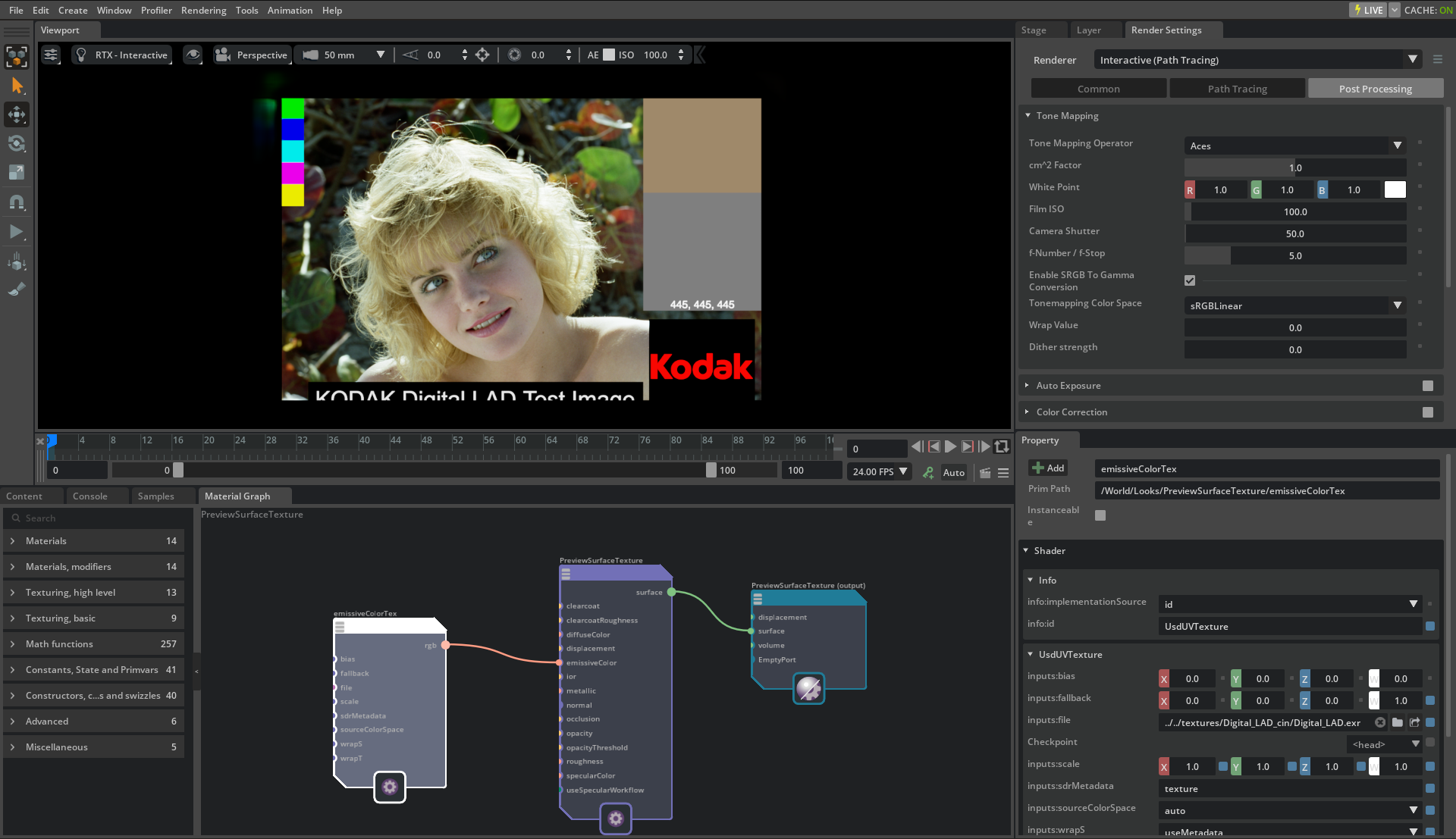Release Notes
Omniverse™ Materials - Release Notes - 2023.1.0
Common
Warning
The USD ecosystem is becoming more strict in enforcing standards. In some cases this can break older assets authored previous to these changes. We have introduced an Asset Validator Extension to help fix these issues and create more robust assets. If you suspect something is wrong when you load an asset or you see a warning, please run the extension which can be found under the sub menu. Refer to the Asset Validator Documentation for more info or to the materials related documentation about the Asset Validator.
Added
Added New Asset Validation rules
Added support for additional MDL Annotations in the Property Panel
Added Pause and Resume Material Compilation in the Material Graph
Added Distilling and Baking of MDL to UsdPreviewSurface
Triplanar Bitmap and Normal Mapping Nodes to the Material Graph
Improved
Material Graph has improved navigation and framing
The UsdPreviewSurface workflow has been rewritten to be compliant with the
UsdPreviewSurface_standard.Material Graph Drag and Drop has been improved and is more stable
Fixed
Fixed various crashes and instability issues
Exposed default USD ports on the Shader node in the Material Graph
Known issues
Omniverse™ Materials - Release Notes - 2022.3.0
Material improvements
UsdPreviewSurface
UsdPreviewSurface now supports unitless emissive texture map values. Previously, the RTX and Iray renderers assumed that map values were in Nits. Emissive units is not specified in the USD specification and in HdStorm and other renderers, the textured value is often the final exposed RGB value in the image.
In 2022.3.0 emissive values are scaled such that their value is equal to the output RGB image for our default camera Exposure
Camera Exposure |
Values
|
|---|---|
ISO |
100
|
Shutter |
50
|
f-stop |
5.0
|

UsdPreviewSurface supports UsdTransform2d and UsdPrimvarReader nodes
MDL Reloading
Omniverse will now dynamically re-load changes to MDL source, updating the MDL database and re-compile the material.
OmniPBRBase
Omniverse adds the base OmniPBR template model to the Material Editor. You can now map and modify inputs directly to the base material model to create custom MDL materials.
Material Editor
Authors can now add their own materials and functions to the Material Editor Node List.
MaterialX Read supports
Omniverse supports reading of .mtlx material documents.
MDL Path Resolution Changes
Summary of the changes for resolving MDL paths:
MDL built-in paths (i.e OmniPBR.mdl, OmniPBR_ClearCoat.mdl, OmniSurface, nvidia/aux_definitions.mdl, nvidia/core_definitions.mdl, OmniUE4Base.mdl, etc.) will no longer be anchored to their referencing layer URL (i.e omniverse://nucleus-server/some/stage.usd or https://server/some/other/stage.usd). These MDL built-in paths will still resolve correctly if they live next to the referencing layer URL but that is completely handled by the client-library and not USD
MDL paths not prefixed with “./” or “../” can still be anchored relative to the referencing layer if they exist and the referencing layer is a URL or file path on disk
MDL built-in paths are no longer considered search paths
MDL built-in paths are no longer considered relative paths unless prefixed with “./” or “../”
This behavior works through SdfAssetPath type Attributes without modifying Sdf
This behavior can be enabled / disabled by setting the environment variable OMNI_USD_RESOLVER_MDL_BUILTIN_BYPASS or in <APPLICATION>/kit/extscore/omni.usd.config/omni/usd_config/extension.py
At the moment, this resolve behavior is disabled by default by can be easily switched
Omniverse™ Materials - Release Notes - 2021.3.0
UI/UX Improvements
New Material Editor for authoring UsdShade graphs
Dragging MDL materials to the Viewport opens Create Material Dialog to specify SubIdentifier material
Added thumbnail icons to material search box.
General improvements
Added standard MDL search paths. MDL defines two sets of standard search paths: User-space and System-space search paths, where User-space search paths take precedence. The search paths can be configured using the MDL_USER_PATH or MDL_SYSTEM_PATH environment variables, respectively. When specifying multiple paths, paths are separated by semicolons (on Windows) or colons (on Linux and Mac OS).
If the environment variable is not set, the following default is used for the User-space search path:
%DOCUMENTS%mdl (on Windows),
$HOME/Documents/mdl (on Linux), and
$HOME/Documents/mdl (on Mac OS),
For the System-space search path:
%PROGRAMDATA%NVIDIA Corporationmdl (on Windows),
/opt/nvidia/mdl (on Linux), and
/Library/Application Support/NVIDIA Corporation/mdl (on Mac OS).
Added a Kit configuration setting “/app/mdl/nostdpath” to disable standard MDL search paths. (default false)
Added a Kit configuration setting “/app/mdl/additionalUserPaths” to add additional user paths, which take precedence over the standard MDL user-space search paths. (default empty)
Added a Kit configuration setting “/app/mdl/additionalSystemPaths” to add additional system paths, which take precedence over the standard MDL system-space search paths. (default empty)
New OmniSurface materials added to core material library
Additional Vray to MDL improvements